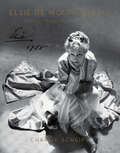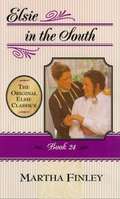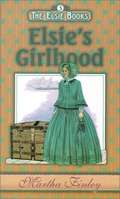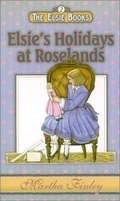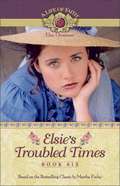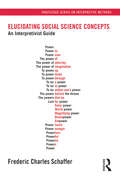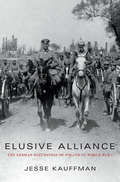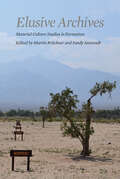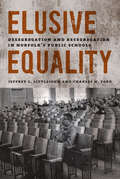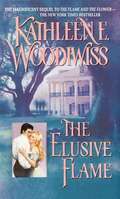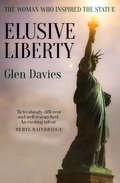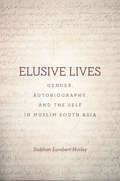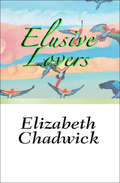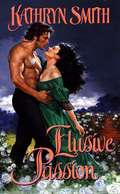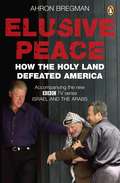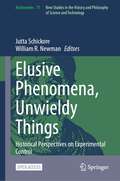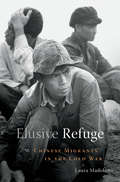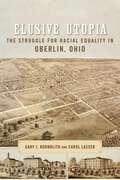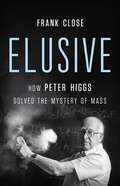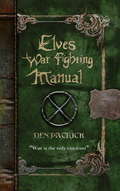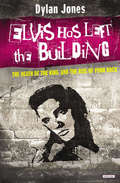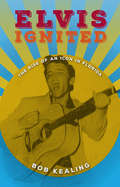- Table View
- List View
Elsie de Wolfe's Paris: Frivolity Before the Storm
by Charlie ScheipsPhotographs and stories of the legendary hostess’s extravagant parties and glamorous guests in the final months before the Nazis invaded France.The American decorator Elsie de Wolfe was the international set’s preeminent hostess in Paris during the interwar years. She had a legendary villa in Versailles, where in the late 1930s she held two fabulous parties—her Circus Balls—that marked the end of the social scene that her friend Cole Porter perfectly captured in his songs, as the clouds of war swept through Europe. Charlie Scheips tells the story of these parties using a wealth of previously unpublished photographs and introducing a large cast of aristocrats, beauties, politicians, fashion designers, movie stars, moguls, artists, caterers, florists, party planners, and decorators. A landmark work of social history and a poignant vision of a vanished world, Scheips’s book “culminates with de Wolfe’s final grand fête, the second Circus Ball, which defined the glamour and decadence of international society before the lights went out all over Europe” (Gotham magazine).
Elsie in the South
by Martha FinleyThere are delights in Elsie's family in the Louisiana and Floridan climates as Max and Lulu both become engaged.
Elsie's Girlhood
by Martha FinleyAs Elsie grows from girlhood to womanhood, so does her family. With the marriage of her father to a woman Elsie has loved from childhood, Elsie is also joined by a brother and sister who adore her. But all the support of her family could not prepare her for what was ahead.
Elsie's Holidays at Roselands
by Martha FinleyAs Elsie grows from childhood to girlhood, so does her understanding of and obedience to God. Guided by jealousy and contempt, her father seeks to annihilate all religious influences surrounding his daughter. As a last resort, her father moves away until Elsie will submit to his law, and no other. This vindictiveness causes Elsie to become very ill.
Elsie's Troubled Times (Book Six of the Elsie Dinsmore: A Life of Faith Series)
by Martha Finley Mission City Press"But the newspapers say it cannot last long, Papa, three months at most," Elsie interjected. "The newspapers are wrong," Horace replied forcefully. "This is American against American, and neither side will be easily defeated," Edward said. Sadly, Horace added, "We must prepare ourselves to wait out a long and bitter conflict. When we next see our homeland, all will be changed forever." Elsie's life seems nearly perfect when she returns home from her honeymoon. But not even the true love of husband and family can shelter her from the great upheaval that lies ahead. They are soon caught up in the bitter struggles between North and South. When the nation is torn apart, how will Elsie and her loved ones deal with its tragedies? Who will survive? "Elsie's Troubled Times", the sixth book of the "Elsie Dinsmore: A Life of Faith" series, takes its heroine into one of the darkest periods of American history, the Civil War. As the war pits brother against brother on the battlefields, Elsie's ideals, loyalties, and even her Christian faith are threatened. "Elsie's Troubled Times", adapted from the 19th century novels written by Martha Finley, is a life-and-death story sure to grip the heart of every reader.
Elton John All the Songs: The Story Behind Every Track (All the Songs)
by Romuald Ollivier Olivier RoubinThis first-of-its-kind catalog of Elton John&’s decades-long career tells the story of one of rock's all-time greatest artists, album-by-album and track-by-track. Organized chronologically and covering every album and song that EGOT-winner Sir Elton Hercules John has ever released, Elton John All the Songs draws upon years of research to tell the behind-the-scenes stories of how each song was written, composed, and recorded, down to the instruments used and the people who played them. Spanning more than fifty-years of work from Elton and his longtime collaborator, Bernie Taupin, this book details the creative processes that resulted in seminal albums like Goodbye Yellowbrick Road, Madman Across the Water, and Tumbleweed Connection, as well as Academy Award wins for 1995's Lion King and 2020's Rocketman. Newer work like The Lockdown Sessions, which released in 2021, is also featured alongside Billboard stats, tour dates, producing and mixing credits, and other insider details that will keep fans turning pages. Starting with the artist's early days working as a studio musician in London, and featuring interviews with actors, musicians, collaborators, and confidantes, Elton John All the Songs offers readers the most detailed portrait of the artist and his creative process that has ever been produced. Featuring hundreds of vivid photographs that celebrate one of music's most visually arresting performers, Elton John All the Songs is the authoritative guide to one of rock'n'roll's greatest stars.
Elucidating Social Science Concepts: An Interpretivist Guide (Routledge Series on Interpretive Methods)
by Frederic Charles SchafferConcepts have always been foundational to the social science enterprise. This book is a guide to working with them. Against the positivist project of concept "reconstruction"—the formulation of a technical, purportedly neutral vocabulary for measuring, comparing, and generalizing—Schaffer adopts an interpretivist approach that he calls "elucidation." Elucidation includes both a reflexive examination of social science technical language and an investigation into the language of daily life. It is intended to produce a clear view of both types of language, the relationship between them, and the practices of life and power that they evoke and sustain. After an initial chapter explaining what elucidation is and how it differs from reconstruction, the book lays out practical elucidative strategies—grounding, locating, and exposing—that help situate concepts in particular language games, times and tongues, and structures of power. It also explores the uses to which elucidation can be put and the moral dilemmas that attend such uses. By illustrating his arguments with lively analyses of such concepts as "person," "family," and "democracy," Schaffer shows rather than tells, making the book both highly readable and an essential guide for social science research.
Elusive Alliance: The German Occupation of Poland in World War I
by Jesse KauffmanJesse Kauffman explains why Germany's ambitious attempt at nation-building in Poland during WWI failed. The educational and political institutions Germany built for its satellite state could not alleviate Poland's hostility to the plundering of its resources to fuel Germany's war effort.
Elusive Archives: Material Culture in Formation (Material Culture Perspectives)
by Oliver Scheiding Wendy Bellion Bernard L. Herman Julian Yates Sarah Wasserman Alexander Lawrence Ames Torsten Cress Julie L. McGee Cindy Ott Laura E. Helton Jennifer Van Horn Kiersten Thamm Alexandra Ward Halina Adams Rosalie Hooper Spencer Wigmore Catherine Morrissey Michelle Everidge Kaila T. Schedeen Lu Ann Cunzo Natalie Elizabeth Wright J. Ritchie Garrison Jesse Kraft Michael J. Emmons Jessica ConradThe essays that comprise Elusive Archives raise a common question: how do we study material culture when the objects of study are transient, evanescent, dispersed or subjective? Such things resist the taxonomic protocols that institutions, such as museums and archives, rely on to channel their acquisitions into meaningful collections. What holds these disparate things together here are the questions authors ask of them. Each essay creates by means of its method a provisional collection of things, an elusive archive. Scattered matter then becomes fixed within each author’s analytical framework rather than within the walls of an archive’s reading room or in cases along a museum corridor. This book follows the ways in which objects may be identified, gathered, arranged, conceptualized and even displayed rather than by “discovering” artifacts in an archive and then asking how they came to be there. The authors approach material culture outside the traditional bounds of learning about the past. Their essays are varied not only in subject matter but also in narrative format and conceptual reach, making the volume accessible and easy to navigate for a quick reference or, if read straight through, build toward a new way to think about material culture.
Elusive Equality: Desegregation and Resegregation in Norfolk's Public Schools
by Jeffrey L. Littlejohn Charles H. FordIn Elusive Equality, Jeffrey L. Littlejohn and Charles H. Ford place Norfolk, Virginia, at the center of the South's school desegregation debates, tracing the crucial role that Norfolk’s African Americans played in efforts to equalize and integrate the city’s schools. The authors relate how local activists participated in the historic teacher-pay-parity cases of the 1930s and 1940s, how they fought against the school closures and "Massive Resistance" of the 1950s, and how they challenged continuing patterns of discrimination by insisting on crosstown busing in the 1970s and 1980s. Despite the advances made by local activists, however, Littlejohn and Ford argue that the vaunted "urban advantage" supposedly now enjoyed by Norfolk’s public schools is not easy to reconcile with the city’s continuing gaps and disparities in relation to race and class. In analyzing the history of struggles over school integration in Norfolk, the authors scrutinize the stories told by participants, including premature declarations of victory that laud particular achievements while ignoring the larger context in which they take place. Their research confirms that Norfolk was a harbinger of national trends in educational policy and civil rights.Drawing on recently released archival materials, oral interviews, and the rich newspaper coverage in the Journal and Guide, Virginian-Pilot, and Ledger-Dispatch, Littlejohn and Ford present a comprehensive, multidimensional, and unsentimental analysis of the century-long effort to gain educational equality. A historical study with contemporary implications, their book offers a balanced view based on a thorough, sober look at where Norfolk’s school district has been and where it is going.
Elusive Flame (The Birmingham Family #3)
by Kathleen E. WoodiwissA woman in desperate straits ... A fearless man ...A marriage of convenience on turbulent waters ... Cerynise Kendall has been left destitute and in dire need following the death of her doting patron and protectress. A brilliant young artist tossed from her home with only the clothes on her back, Cerynise must now turn to a childhood companion for assistance - the dashing sea captain Beauregard Birmingham and beg him to provide her with passage to the Carolinas. She seeks a new home and a new life across the waters, but all depends upon the kindness of a charming adventurer who was once the object of her youthful infatuation. Beneath Birmingham's rugged exterior beats a heart as large and wild as the Atlantic, and Beau readily agrees to aid Cerynise - even offering her his name in marriage, albeit temporarily, to protect his long time friend from scandal. But perilous secrets, determined enemies and tempests of the sea and soul threaten their future and safe passage even as bonds of camaraderie are miraculously reforged as bonds of desire ... and affection becomes passion and love.
Elusive Liberty: The Woman Who Inspired the Statue
by Glen DaviesThe woman immortalized as the Statue of Liberty comes to life in this “refreshingly different and well researched” novel of nineteenth century France (Beryl Bainbridge, author of The Dressmaker). France, 1867. The elite of the world have come to Paris for the Great Exhibition, where they can enjoy the sophistication of the French Empire of Napoleon III. At the Imperial court, young Jeanne-Emilie de Lamont meets the man who will change her life: Frederic Bartholdi, the Republican sculptor who finds in her the inspiration for his greatest creation. When France and Prussia go to war, Emilie’s world is thrown into turmoil. As Bismarck’s army surrounds Paris, she sees a side of the city—and of herself—she never before imagined. While Paris reels under the twin blows of war and revolution, Frederic’s hopes for his Statue of Liberty are under threat. It will take a new continent, and an old dream, to save it. But can he save the girl who was Liberty? A sweeping historical epic, Elusive Liberty takes the reader from the splendor of the Great Paris Exhibition to the Pyramids of Egypt, from the Franco-Prussian War to Philadelphia’s Centennial Exhibition in 1876. “An exciting talent.” —Beryl Bainbridge, author of Master Georgie
Elusive Lives: Gender, Autobiography, and the Self in Muslim South Asia (South Asia in Motion)
by Siobhan Lambert-HurleyMuslim South Asia is widely characterized as a culture that idealizes female anonymity: women's bodies are veiled and their voices silenced. Challenging these perceptions, Siobhan Lambert-Hurley highlights an elusive strand of autobiographical writing dating back several centuries that offers a new lens through which to study notions of selfhood. In Elusive Lives, she locates the voices of Muslim women who rejected taboos against women speaking out, by telling their life stories in written autobiography. To chart patterns across time and space, materials dated from the sixteenth century to the present are drawn from across South Asia – including present-day India, Pakistan and Bangladesh. Lambert-Hurley uses many rare autobiographical texts in a wide array of languages, including Urdu, English, Hindi, Bengali, Gujarati, Marathi, Punjabi and Malayalam to elaborate a theoretical model for gender, autobiography, and the self beyond the usual Euro-American frame. In doing so, she works toward a new, globalized history of the field. Ultimately, Elusive Lives points to the sheer diversity of Muslim women's lives and life stories, offering a unique window into a history of the everyday against a backdrop of imperialism, reformism, nationalism and feminism.
Elusive Lovers
by Elizabeth ChadwickFleeing temptation, a woman starts her life over in a Colorado mining town in this captivating historical romance from the author of Reluctant Lovers. One passionate moment has ruined Kristin Taube&’s pristine reputation. Now Jack Cameron owes her the innocence he stole away when he snatched that first kiss. When Kristin flees her home to begin a new life as an artist, Jack will follow her to the ends of the earth to unlock the secrets of the heart he roused from its slumber.
Elusive Passion (Ryland Brothers #1)
by Kathryn SmithWho is the mysterious Varya? On the surface she's a woman who tempts men beyond reason, but no one has touched the heart of the elusive creature...that is, until now Miles Christian, the Marquess of Wynter, never expected to be abducted at gunpoint and accused of murder - and certainly not by a woman! When he discovers his would-be kidnapper is the elusive Varya, a beauty courted - and desired - by most of the men in London society, he is doubly shocked ... and enthralled. Obsessed with this seductress, Miles is determined to keep her by his side as they hunt for the true culprit, even if it means putting them both in danger. For Varya the danger lies in Miles's very touch, and though she's far from ready to trust the dashing rogue, she cannot deny the attraction that flares between them. But when they are caught in a compromising position, Varya reluctantly agrees to pose as Miles's mistress, even as she resists his potent efforts to woo her into his bed. For none could guess that her bloodlines are as pure as any English aristocrat's or that behind her public mask lies a woman determined not to relinquish her hard-won independence to a man's desire - unless she ensnares his heart as well.
Elusive Peace: How the Holy Land Defeated America
by Dr Ahron BregmanEhud Barak's election as Prime Minister of Israel on 17th May 1999 and his determination to conclude a peace deal with the Palestinians inspired both Israeli voters and the international community. So where did it all go wrong? How did it end, less than two years later, in the total failure of Barak's peace efforts, his defeat at the polls and ejection from office? How did he open the way not to peace, but to Ariel Sharon?Drawing on exclusive interviews with all the major international figures involved, this book traces the history of the Middle East peace process from Barak's election, through the peace talks at Camp David to the current Road Map. It illuminates the characters of Clinton, Arafat, Sharon and many others, and offers many insights into one of the most complex political political situations in the world today.
Elusive Phenomena, Unwieldy Things: Historical Perspectives on Experimental Control (Archimedes #71)
by Jutta Schickore William R. NewmanThis open access book provides a historical treatment of scientific control in experimentation in the longue durée. The introduction distinguishes four related strands in the history of experimental control: the development of practices to stabilize experimental conditions; the career of the comparative design; the unfolding of methodological discussions about control practices and designs; and the history of the term “control”. Each chapter brings these distinctions to bear on specific historical episodes. The focus is on experiments with complex, elusive phenomena such as perception and learning, irregular movements, and unobservable elements. Such experiments bring control issues to the fore because they are difficult to design and stabilize and often controversial. Together, the chapters show that the local context shapes what exactly is controlled, how control can be accomplished, and how controls are justified. They also show that control strategies and methodological ideas often remain stable for a long time and change only gradually. This book, as well as the volume on analysis and synthesis in experimentation by the same editors, contains contributions by an array of experts from multiple disciplines, making it suitable for historians and philosophers of science and students alike.
Elusive Refuge
by Laura MadokoroLaura Madokoro recovers the lost history of millions of displaced Chinese who fled the Communist Revolution and recounts humanitarian efforts to find homes for them outside China. Entrenched bigotry in predominantly white countries, the spread of human rights, Cold War geopolitics, and the Vietnam War shaped refugee policies that still hold sway.
Elusive Refuge: Chinese Migrants in the Cold War
by Laura MadokoroThe 1949 Chinese Communist Revolution is a subject of inexhaustible historical interest, but the plight of millions of Chinese who fled China during this tumultuous period has been largely forgotten. Elusive Refuge recovers the history of China’s twentieth-century refugees. Focusing on humanitarian efforts to find new homes for Chinese displaced by civil strife, Laura Madokoro points out a constellation of factors—entrenched bigotry in countries originally settled by white Europeans, the spread of human rights ideals, and the geopolitical pressures of the Cold War—which coalesced to shape domestic and international refugee policies that still hold sway today.Although the United States, Canada, Australia, New Zealand, and South Africa were home to sizeable Asian communities, Chinese migrants were a perpetual target of legislation designed to exclude them. In the wake of the 1949 Revolution, government officials and the broader public of these countries questioned whether Chinese refugees were true victims of persecution or opportunistic economic migrants undeserving of entry. It fell to NGOs such as the Lutheran World Federation and the World Council of Churches to publicize the quandary of the vast community of Chinese who had become stranded in Hong Kong.These humanitarian organizations achieved some key victories in convincing Western governments to admit Chinese refugees. Anticommunist sentiment also played a role in easing restrictions. But only the plight of Southeast Asians fleeing the Vietnam War finally convinced the United States and other countries to adopt a policy of granting permanent residence to significant numbers of refugees from Asia.
Elusive Utopia: The Struggle for Racial Equality in Oberlin, Ohio (Antislavery, Abolition, and the Atlantic World)
by Edward Bartlett Rugemer Gary Kornblith Richard J. Blackett Carol LasserBefore the Civil War, Oberlin, Ohio, stood in the vanguard of the abolition and black freedom movements. The community, including co-founded Oberlin College, strove to end slavery and establish full equality for all. Yet, in the half-century after the Union victory, Oberlin’s resolute stand for racial justice eroded as race-based discrimination pressed down on its African American citizens. In Elusive Utopia, noted historians Gary J. Kornblith and Carol Lasser tell the story of how, in the nineteenth and early twentieth centuries, Oberlin residents, black and white, understood and acted upon their changing perceptions of race, ultimately resulting in the imposition of a color line.Founded as a utopian experiment in 1833, Oberlin embraced radical racial egalitarianism in its formative years. By the eve of the Civil War, when 20 percent of its local population was black, the community modeled progressive racial relations that, while imperfect, shone as strikingly more advanced than in either the American South or North. Emancipation and the passage of the Civil War amendments seemed to confirm Oberlin's egalitarian values. Yet, contrary to the expectations of its idealistic founders, Oberlin’s residents of color fell increasingly behind their white peers economically in the years after the war. Moreover, leaders of the white-dominated temperance movement conflated class, color, and respectability, resulting in stigmatization of black residents. Over time, many white Oberlinians came to view black poverty as the result of personal failings, practiced residential segregation, endorsed racially differentiated education in public schools, and excluded people of color from local government. By 1920, Oberlin’s racial utopian vision had dissipated, leaving the community to join the racist mainstream of American society.Drawing from newspapers, pamphlets, organizational records, memoirs, census materials and tax lists, Elusive Utopia traces the rise and fall of Oberlin's idealistic vision and commitment to racial equality in a pivotal era in American history.
Elusive Victory: The Arab-israeli Wars, 1947-1974
by Trevor N. DupuyFrom the prologue, "All wars have political causes, all have political origins. However, the series of conflicts between Israelis and Arabs since 1948 have their roots farther back in history than most of the wars of recent times, and their causes are a complicated mixture of political, ideological, and religious differences that are not easily susceptible to negotiation and resolution."
Elusive: How Peter Higgs Solved the Mystery of Mass
by Frank Close*A New York Times Book Review Editor's Choice Selection* The first major biography of Peter Higgs, revealing how a short burst of work changed modern physics On July 4, 2012, the announcement came that one of the longest-running mysteries in physics had been solved: the Higgs boson, the missing piece in understanding why particles have mass, had finally been discovered. On the rostrum, surrounded by jostling physicists and media, was the particle&’s retiring namesake—the only person in history to have an existing single particle named for them. Why Peter Higgs? Drawing on years of conversations with Higgs and others, Close illuminates how an unprolific man became one of the world&’s most famous scientists. Close finds that scientific competition between people, institutions, and states played as much of a role in making Higgs famous as Higgs&’s work did. A revelatory study of both a scientist and his era, Elusive will remake our understanding of modern physics.
Elves War-Fighting Manual
by Den PatrickA manual, complete with illustrations, that looks at the Elvish race and the way they fight war. With a history of the race, an assessment on how they, as immortals, face death, and accounts of famous engagements, this is the perfect companion for any fantasy wargamer or roleplayer, as well as being a door into a wonderful and original fantasy world.
Elvis Has Left the Building: The Death of the King and the Rise of Punk Rock
by Dylan Jones&“An interesting look at how 1977 marked the explosion of punk alongside this heartbreaking (though not altogether surprising) loss of a legend&” (USA Today). In the late 1970s, punk music was setting out to destroy everything Elvis Presley had come to represent. But punk couldn&’t destroy The King himself—he had already done that, succumbing to his excesses at Graceland on August 16, 1977. Ever since, Elvis has permeated the world in ways that are bizarre and inexplicable: a pop icon while alive, he has become almost a religious icon in death, a modern-day martyr crucified on the wheel of drugs, celebrity culture, junk food, and sex. In Elvis Has Left the Building, Dylan Jones takes us back to those heady days around the time of his death and the simultaneous rise of punk. Evoking the hysteria and devotion of The King&’s numerous disciples and imitators, Jones offers a uniquely insightful commentary on Elvis&’s life, times, and outrageous demise. Recounting how the artist single-handedly changed the course of popular music and culture, he also delves deep into the cult of The King and reveals what Elvis&’s death meant—and still means to us today. &“I&’m not sure punk would have existed without [Elvis]. In fact I&’m not sure a lot of things would have existed without him. Dylan Jones is the right man to ponder such questions.&” —Bono &“A gripping tale of impossible success and terrible waste and lost beauty that veers from Memphis to Las Vegas and all the way to the broken backstreets of London.&” —Tony Parsons, author of The Hanging Club
Elvis Ignited: The Rise of an Icon in Florida
by Bob Kealing“A persuasive argument that Presley’s “moonshot” to fame could not have happened without Florida. . . . Deftly captures a pre-Interstate Florida where an anonymous Presley would be traveling for grueling hours down every two-laner in the state in his signature automobile.”—Palm Beach Post “I don’t think there was a better time and place to be a teenager than in Florida in the 1950s. It was such a magical place. Elvis is part of what contributed to that excitement.”—Bob Graham, former Florida governor and United States senator “Kealing tells us the story of what happened when Elvis arrived in Florida and what role the Sunshine State played in his life and musical career. This is a critical era in the Elvis Saga.”—William McKeen, editor of Rock and Roll Is Here to Stay: An Anthology “A Florida-centric look at his 1956 breakout state for people who thought they knew everything about Elvis.”—Joel Selvin, author of Altamont: The Rolling Stones, the Hells Angels, and the Inside Story of Rock’s Darkest Day “Presents a great picture of what it was like to be a touring musician in the 1950s and also of Florida at the time and how the culture was changed by the shock of Elvis.”—Joy Wallace Dickinson, author of Remembering Orlando: Tales from Elvis to Disney It was his most electric and influential time as a live performer. The young and hungry Elvis burst onto stages large and small—sexy, controversial, brimming with talent and ambition. One lightning-hot year in Florida fueled his rise from novelty act to headlining megastar. Elvis Ignited tracks the rising star through his tours of Florida, from 1955 when Presley was an unknown to 1956 when Presley played more concerts in Florida than in any other state. In only fifteen months, Presley toured Florida four times, becoming the object of worship, scorn, and controversy. Struck by a new kind of music and performances so different from anything they had known before, Floridians saw how special Elvis was before the rest of the world caught on. Before their very eyes, he transformed from Hillbilly Cat to the King of Rock and Roll. Bob Kealing interviews people who saw the King up close, recalling the time-stands-still memories of hearing his iconic songs for the first time. He speaks with Floridians who helped Elvis along the way: the late Jim Kirk from Ocala, who offered Presley his first headlining opportunity; former governor and U.S. senator Bob Graham, who saw the young rockabilly god at the dawning of Elvis mania; Steve Binder, who produced Presley’s ’68 Comeback Special; and Country Music Hall of Famer Charlie Louvin, who opened for Presley in Florida. Kealing follows Elvis after his return from the Army to his homecoming TV special in Miami with Frank Sinatra and through the filming of Follow That Dream in Florida in 1961, offering unique insights into the singer’s relationship with co-star Anne Helm, his controversial manager Tom Parker, and the beginnings of his melancholy as a prisoner of fame. This book is a roadmap to Elvis’s time in the Sunshine State, a guide to the many small and large venues he played up and down the peninsula, and a spotlight on the people who witnessed, supported, and even opposed his meteoric rise to fame. It was a turning point in American music history; it was the arrival of rock and roll.
